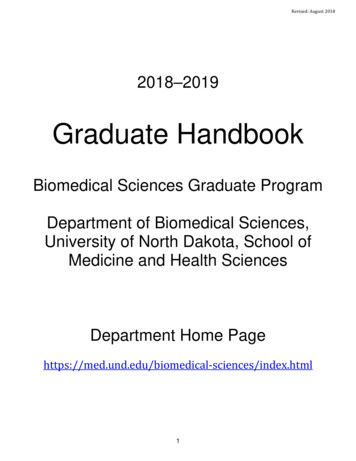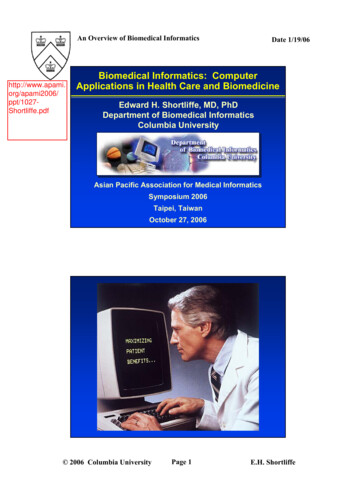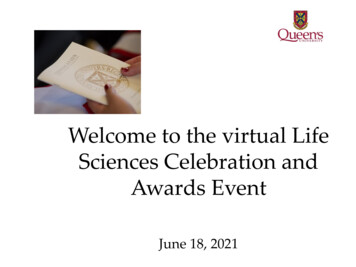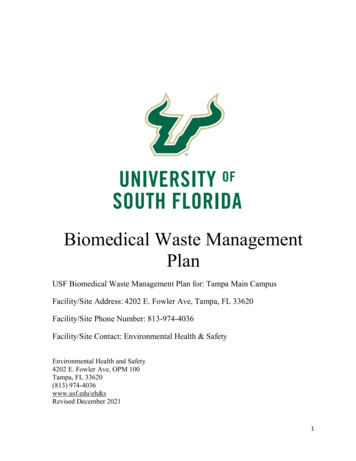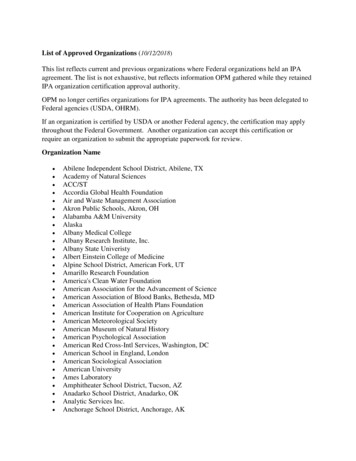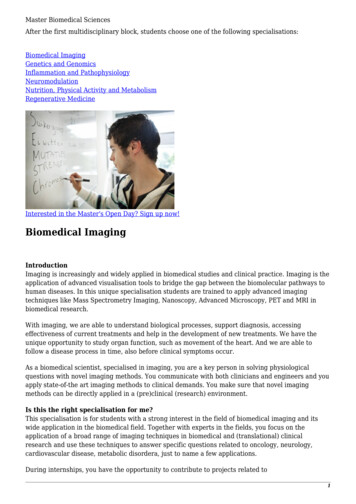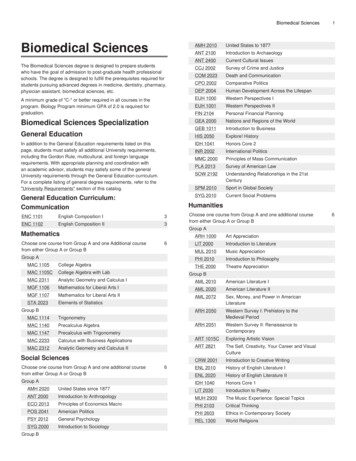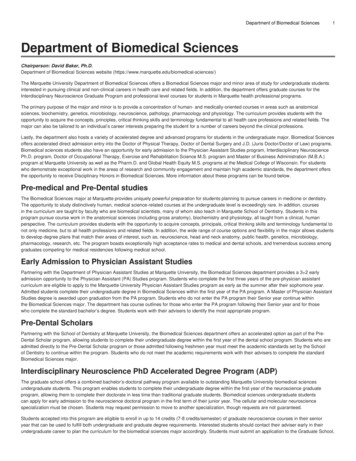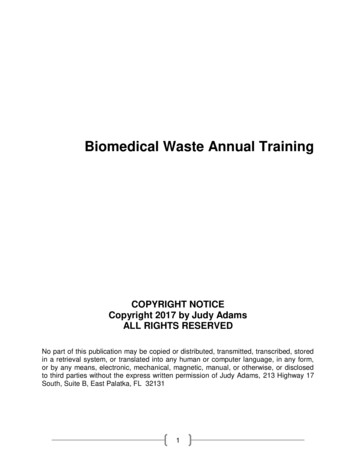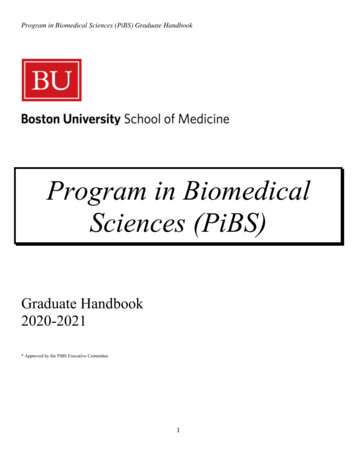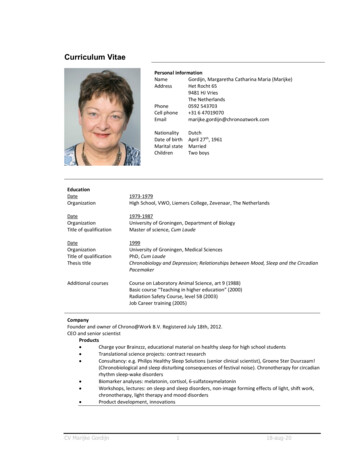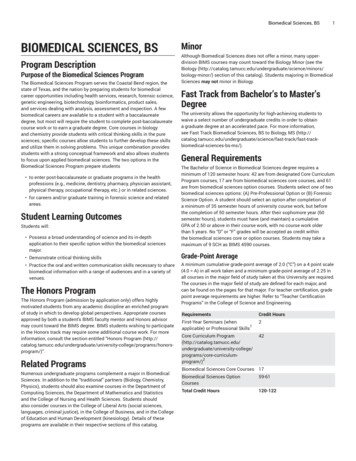
Transcription
Biomedical Sciences, BSBIOMEDICAL SCIENCES, BSProgram DescriptionPurpose of the Biomedical Sciences ProgramThe Biomedical Sciences Program serves the Coastal Bend region, thestate of Texas, and the nation by preparing students for biomedicalcareer opportunities including health services, research, forensic science,genetic engineering, biotechnology, bioinformatics, product sales,and services dealing with analysis, assessment and inspection. A fewbiomedical careers are available to a student with a baccalaureatedegree, but most will require the student to complete post-baccalaureatecourse work or to earn a graduate degree. Core courses in biologyand chemistry provide students with critical thinking skills in the puresciences; specific courses allow students to further develop these skillsand utilize them in solving problems. This unique combination providesstudents with a strong conceptual framework and also allows studentsto focus upon applied biomedical sciences. The two options in theBiomedical Sciences Program prepare students to enter post-baccalaureate or graduate programs in the healthprofessions (e.g., medicine, dentistry, pharmacy, physician assistant,physical therapy, occupational therapy, etc.) or in related sciences. for careers and/or graduate training in forensic science and relatedareas.Student Learning OutcomesStudents will: Possess a broad understanding of science and its in-depthapplication to their specific option within the biomedical sciencesmajor. Demonstrate critical thinking skills Practice the oral and written communication skills necessary to sharebiomedical information with a range of audiences and in a variety ofvenues.The Honors ProgramThe Honors Program (admission by application only) offers highlymotivated students from any academic discipline an enriched programof study in which to develop global perspectives. Appropriate coursesapproved by both a student’s BIMS faculty mentor and Honors advisormay count toward the BIMS degree. BIMS students wishing to participatein the Honors track may require some additional course work. For moreinformation, consult the section entitled “Honors Program y-college/programs/honorsprogram/)”.Related ProgramsNumerous undergraduate programs complement a major in BiomedicalSciences. In addition to the “traditional” partners (Biology, Chemistry,Physics), students should also examine courses in the Department ofComputing Sciences, the Department of Mathematics and Statisticsand the College of Nursing and Health Sciences. Students shouldalso consider courses in the College of Liberal Arts (social sciences,languages, criminal justice), in the College of Business, and in the Collegeof Education and Human Development (kinesiology). Details of theseprograms are available in their respective sections of this catalog.1MinorAlthough Biomedical Sciences does not offer a minor, many upperdivision BIMS courses may count toward the Biology Minor (see theBiology inors/biology-minor/) section of this catalog). Students majoring in BiomedicalSciences may not minor in Biology.Fast Track from Bachelor’s to Master’sDegreeThe university allows the opportunity for high-achieving students towaive a select number of undergraduate credits in order to obtaina graduate degree at an accelerated pace. For more information,see Fast Track Biomedical Sciences, BS to Biology, MS neral RequirementsThe Bachelor of Science in Biomedical Sciences degree requires aminimum of 120 semester hours: 42 are from designated Core CurriculumProgram courses, 17 are from biomedical sciences core courses, and 61are from biomedical sciences option courses. Students select one of twobiomedical sciences options: (A) Pre-Professional Option or (B) ForensicScience Option. A student should select an option after completion ofa minimum of 35 semester hours of university course work, but beforethe completion of 50 semester hours. After their sophomore year (60semester hours), students must have (and maintain) a cumulativeGPA of 2.50 or above in their course work, with no course work olderthan 5 years. No “D” or “F” grades will be accepted as credit withinthe biomedical sciences core or option courses. Students may take amaximum of 9 SCH as BIMS 4590 courses.Grade-Point AverageA minimum cumulative grade-point average of 2.0 (“C”) on a 4 point scale(4.0 A) in all work taken and a minimum grade-point average of 2.25 inall courses in the major field of study taken at this University are required.The courses in the major field of study are defined for each major, andcan be found on the pages for that major. For teacher certification, gradepoint average requirements are higher. Refer to “Teacher CertificationPrograms” in the College of Science and Engineering.RequirementsCredit HoursFirst-Year Seminars (when1applicable) or Professional Skills2Core Curriculum )42Biomedical Sciences Core Courses 17Biomedical Sciences OptionCourses59-61Total Credit Hours120-122
2Biomedical Sciences, BS11Full-time, first time in college students are required to take the first-yearseminars. UNIV 1101 University Seminar I (1 sch)Only the 3 lecture hours of each will apply to the Core CurriculumProgram. Each one-hour laboratory component will be counted in theComponent Area Option of the University Core Curriculum. The 3 lecturehours of General Chemistry I (CHEM 1411 General Chemistry I (4 sch))will also be counted in the Component Area Option of the UniversityCore Curriculum, but the 1 laboratory hour will be counted as part of theBiomedical Science core. UNIV 1102 University Seminar II (1 sch)Students entering with some college credit may not be required totake one or both of the First-Year Seminar courses (see The First YearLearning Communities Program for rules and exceptions concerningthese courses). Students in the Pre-Professional or Forensic Scienceoptions who are not required to take these First-Year Seminar coursesmust take BIMS 2200 Professional Skills (2 sch) Professional Skills (seebelow).2Unless student has credit for MATH 1442 Statistics for Life (4 sch) Select at least one Forensic Science Option—Elective2Three 4-hour science and mathematics courses are required for allBiomedical Sciences students: BIOL 1406 Biology I (4 sch), BIOL 1407Biology II (4 sch), and MATH 1442 Statistics for Life (4 sch)). Only the 3lecture hours of each will apply to the Core Curriculum Program. Eachone-hour laboratory component will be counted in the Component AreaOption of the University Core Curriculum. The 3 lecture hours of GeneralChemistry I (CHEM 1411 General Chemistry I (4 sch)) will also be countedin the Component Area Option of the University Core Curriculum, but the 1laboratory hour will be counted as part of the Biomedical Science core.Program RequirementsCodeTitleHoursFull-time, First-year Students/Professional SkillsUNIV 1101University Seminar I1UNIV 1102University Seminar II1Students in the Pre-Professional or Forensic Science option who arenot required to take these First-Year Seminars must take:BIMS 2200Core Curriculum ProgramBiomedical Sciences majors must take:1Each multi-disciplinary option provides specific background in an areaof biomedical sciences that corresponds to the student’s career choice.For the baccalaureate degree, an option consists of requirements andelectives totaling 59-61 semester hours of course work.Pre-Professional OptionThis option is designed for students who plan to continue their educationin a professional school (e.g., medicine, dentistry, veterinary medicine,pharmacy, physical therapy, occupational therapy, physician assistant,etc.) or graduate school. Students in this option must choose eitherMATH 1442 Statistics for Life (4 sch) or MATH 2413 Calculus I (4 sch) tosatisfy the University Core requirement in mathematics, and they mustcomplete BIMS 4085 Major Field Test in Biology (0 sch) during theirsenior year, prior to graduation.CodeTitle42BIMS 4085Major Field Test in Biology0CHEM 3412Organic Chemistry II4MATH 1442Statistics for Life (lecture hours included in1University Core)1Pre-Professional Option ElectivesBIOL 1406Biology IBIOL 1407Biology IIBIMS 2171Medical TerminologyMATH 1442Statistics for LifeBIMS 3300Animal NutritionCHEM 1411General Chemistry IBIMS 3301Introduction to Animal ScienceBIMS 3401PathophysiologySelect 49 hours of the following:Biomedical Sciences Core CoursesBIOL 1406Biology I (included in University Core)BIMS 3403Molecular BiologyBIOL 1407Biology II (included in University Core)BIMS 4170Biomedical SeminarBIOL 2416Genetics4BIMS 4295Biomedical PracticumBIOL 2421Microbiology4BIMS 4296Clinical ResearchCHEM 1411General Chemistry I (lecture hours included inUniversity Core)1BIMS 4299Directed Independent ResearchCHEM 1412General Chemistry II4BIMS 4311Biology of CancerCHEM 3411Organic Chemistry I4BIMS 4323NeurobiologyBIMS 4327Introduction to ToxicologyBIMS 4330Biological Basis of AgingBIMS 4341Health DisparitiesBIMS 4333Medical EntomologyBIMS 4334Human GeneticsBIMS 4335EndocrinologyBIMS 4374Medical MicrobiologyBIMS 4375Mechanisms of Microbial PathogenesisBiomedical Sciences OptionsSelect one of the following Options:59-61Pre-Professional Option (p. 2)Forensic Science Option (p. 3)Total HoursHoursPre-Professional Option Required CoursesProfessional SkillsUniversity Core CurriculumBiomedical Sciences Options120-12249
Biomedical Sciences, BS3(biology, biomedical sciences, chemistry, physics), social sciences(psychology, sociology), computer science, health sciences, criminaljustice, kinesiology, or business.BIMS 4396Directed Independent StudyBIMS 4406ImmunologyBIMS 4410HistologyBIMS 4590Selected Topics (with approval of faculty mentor)BIOL 3345Cell PhysiologyBIOL 3410Cell BiologyBIOL 3425Functional AnatomyBIOL 3430PhysiologyBIOL 4301EmbryologyBIOL 4304Biology of VirusesBIOL 4340Genomics, Proteomics and BioinformaticsBIOL 4350Research and DesignBIOL 4408Microbial Diversity and EcologyBIOL 4433ParasitologyBIOL 4435Biological MicrotechniquesCHEM 4320Drugs, Toxins and Natural Products ChemistryCHEM 4401Biochemistry ICHEM 4402Biochemistry IIMATH 2413Calculus I (if not counted in the University Core)MATH 3342Applied Probability and StatisticsPHYS 1401General Physics IPHYS 1402General Physics II contact the appropriate school(s) to determine their specific entrancerequirements. obtain a sample degree plan for a particular career field. These areavailable on the BIMS web site, from the student’s faculty mentor oracademic advisor, or through the Pre-professional website (http://prepro.tamucc.edu).33Forensic Science Option212 hours of other approved electivesTotal Hours541The 3 lecture hours count as Math foundations in the University core. The1 hour of lab counts in the Component Area Option2Unless student has credit for MATH 1442 Statistics for Life (4 sch)3May not apply elective credit for either BIOL 2401 & 2402 if they takeeither BIOL 3430 or BIOL 3425.Additional InformationThis option has flexible degree requirements with many electives toaccommodate the different professional schools’ diverse entrancerequirements. In the list of electives above, however, not every courseis appropriate for every student and some courses are best taken at aparticular time. For example:Students should take basic science courses such as BIMS 3403Molecular Biology (4 sch), BIMS 4406 Immunology (4 sch), BIOL 3425Functional Anatomy (4 sch), BIOL 3430 Physiology (4 sch), CHEM 4401Biochemistry I (4 sch), CHEM 4402 Biochemistry II (4 sch), PHYS 1401General Physics I (4 sch), PHYS 1402 General Physics II (4 sch) beforethey attempt standardized admissions tests (usually at the end of theirjunior year). Most professional schools encourage applicants to have abroad background in the basic sciences, and these courses are helpfuleven if they are not specifically required for admission to a particularcareer area.To decide which electives to choose, students should: consult their faculty mentor and academic advisor who canalso provide information about the “other mentor approvedelectives” which may include nonlisted courses in natural sciencesThis interdisciplinary option allows students to prepare for careers inforensic science (including entrance into graduate programs in forensicscience and related areas). Prospective students should be aware thatemployers in forensic science typically require employees to meetpersonal suitability requirements (e.g., honesty, integrity, and scientificobjectivity). Background checks and drug tests similar to those requiredfor law enforcement officers are likely to be a condition of employment.Students in this option must choose MATH 2413 Calculus I (4 sch) tosatisfy the University Core requirement in mathematics. Elective coursesallow the student to begin to specialize in an emphasis area such asforensic biology (mainly biology and biomedical sciences courses),forensic chemistry (mainly chemistry courses), or general forensicscience. A student’s degree plan may include a maximum of six hours ofinternship, research, or independent study (e.g., BIMS 4295 BiomedicalPracticum (2 sch), BIMS 4299 Directed Independent Research (1-2 sch),BIMS 4396 Directed Independent Study (1-3 sch), or BIOL 4350 Researchand Design (1-3 sch)). Students in this option must take a standardizedassessment test during their senior year, prior to graduation.CodeTitleHoursForensic Science Option Required CoursesCLSC 3200Essentials for Applied Laboratory Sciences2BIMS 3103Essentials Laboratory for Forensic Science1BIMS 3320Survey of Forensic Science3BIMS 3325Professional Practice in Forensic Science3CHEM 3412Organic Chemistry II4CHEM 3418Instrumental Analysis4CRIJ 4340Criminal InvestigationSelect one of the following:MATH 1442Statistics for LifeMATH 3342Applied Probability and StatisticsMATH 241333-4Calculus I (3 hours included in University Core)Select one of the following:14PHYS 2425University Physics I (preferred)PHYS 1401General Physics ISelect one of the following:4PHYS 2426University Physics II (preferred)PHYS 1402General Physics IIForensic Science Option ElectivesSelect 21-22 hours of the following:21-22BIMS 3401PathophysiologyBIMS 3402Introduction to Forensic AnthropologyBIMS 3403Molecular BiologyBIMS 4295Biomedical PracticumBIMS 4299Directed Independent ResearchBIMS 4395Forensic Science Internship1
4Biomedical Sciences, BSCLSC 4325Clinical Chemistry IUNIV 1102University Seminar II1CLSC 4326Clinical Chemistry IIENGL 1302Writing and Rhetoric II3BIMS 4327Introduction to ToxicologyMATH 2413Calculus I4BIMS 4333Medical EntomologyBIMS 4340Forensic Science in Criminal LawSummerBIMS 4396Directed Independent StudyHIST 1301U.S. History to 18653BIMS 4406ImmunologyHIST 1302U.S. History Since 18653BIMS 4410HistologyHours6BIMS 4428Medicolegal Death InvestigationsSecond YearBIMS 4439Case Work Methods in Forensic AnthropologyFallBIMS 4590Selected Topics (with approval of faculty mentor)BIOL 2416Genetics4BIOL 2472Principles of BotanyCHEM 3411Organic Chemistry I4BIOL 3410Cell BiologyBIOL 2371Principles of Evolution3BIOL 3425Functional AnatomyBIOL 3430PhysiologyBIOL 4340Genomics, Proteomics and BioinformaticsSpringBIOL 4350Research and DesignBIOL 2421Microbiology4BIOL 4371Population GeneticsCHEM 3412Organic Chemistry II4BIOL 4433ParasitologyBiological MicrotechniquesPSYC 2301or SOCI 1301General Psychologyor Introduction to Sociology3BIOL 4435CHEM 3417Quantitative AnalysisCHEM 4320Drugs, Toxins and Natural Products ChemistrySummerCHEM 4401Biochemistry IPOLS 2305U.S. Government and Politics3CHEM 4402Biochemistry IIPOLS 2306State and Local Government3CHEM 4407Advanced Inorganic ChemistryHours6CHEM 4420Physical BiochemistryThird YearCHEM 4423Physical Chemistry IFallCHEM 4424Physical Chemistry IIPHYS 1401General Physics I4ENGL 3301Technical and Professional WritingCHEM 4401Biochemistry I4MATH 2414Calculus IILanguage, Philosophy & Culture Core Requirement(ENGL 2316, 2332, 2333)3Hours12Creative Arts Core Requirement2Hours1Hours11112 hours of other approved electivesTotal Hours53-551HoursPHYS 14022General Physics IICHEM 4402Biochemistry IIor BIMS 3403or Molecular BiologyMay not apply elective credit for either BIOL 2401 & 2402 if they takeeither BIOL 3430 or BIOL 3425.MATH 1442Statistics for Lifeor MATH 3342or Applied Probability and Statisticsor BIOL 3325or BiostatisticsCourse SequencingPre-ProfessionalBIOL 4334or BIOL 3345First YearHoursBIOL 1406Biology I4CHEM 1411General Chemistry I4UNIV 1101University Seminar I1COMM 1311Foundation of Communication3MATH 2312Precalculus3HoursCell Biology31411415SpringSelect at least one of these coursesFallBIOL 34101615SpringBIOL 1407Biology II4CHEM 1412General Chemistry II4Biology and Ecology of Coral Reefsor Cell PhysiologyHours443-4314-15SummerBIMS 4327or BIOL 4304Introduction to Toxicologyor Biology of Viruses3Hours3Fourth YearFallBIOL 3430Physiologyor BIMS 3401or Pathophysiology4BIMS 4311Biology of Canceror BIMS 4374or Medical Microbiology3
Biomedical Sciences, BSBIOL 4340Genomics, Proteomics and Bioinformatics(or other BIMS/BIOL/CHEM elective)BIMS 4335Endocrinologyor BIOL 4408or Microbial Diversity and Ecologyor BIMS 4410or Histologyor BIMS 4375or Mechanisms of MicrobialPathogenesisHours33-413-14Neurobiology (OR BIOL)3BIMS 4406Immunology4BIOL or BIMS OR CHEM elective4BIMS 40850Total HoursPOLS 2305U.S. Government and Politics3POLS 2306State and Local Government3Hours6PHYS 1401General Physics Ior PHYS 2425or University Physics I4CHEM 44014FallBIMS 4323HoursSummerThird YearSpringMajor Field Test in Biology511124-126Biochemistry ICreative Arts Core Requirement3ENGL 2316Literature and Cultureor ENGL 2332or Literature of the Western World: Fromor ENGL 2333the Classics to the Renaissanceor Literature of the Western World: Fromthe Enlightenment to the Present3BIMS Forensic Science ElectiveForensic ScienceFirst Year3Hours17SpringFallHoursBiology I4PHYS 1402General Physics IIor PHYS 2426or University Physics II4BIOL 1406CHEM 1411General Chemistry I4CHEM 4402Biochemistry II4UNIV 1101University Seminar I1CHEM 3418Instrumental Analysis43BIMS 3325Professional Practice in Forensic Scienceor BIMS 4340or Forensic Science in Criminal Law3COMM 1311Foundation of CommunicationMATH 2312Precalculusor MATH 2413or Calculus IHours3-4Hours15-16BIMS 4327SpringIntroduction to Toxicology3Hours3BIMS 4410or BIOL 3410Histologyor Cell Biology4ENGL 3301Technical and Professional Writing3BIOL 1407Biology II4CHEM 1412General Chemistry II4Fourth YearUNIV 1102University Seminar II1FallENGL 1302Writing and Rhetoric II3MATH 2413Calculus Ior PSYC 2301or General Psychologyor SOCI 1301or Introduction to SociologyHours3-415SummerBIMS Forensic Science Elective15-163BIMS Forensic Science ElectiveSummer4HoursHIST 1301U.S. History to 18653HIST 1302U.S. History Since 18653Hours6Second YearTotal Hours14121-123CoursesBiology CoursesFallBIOL 2416Genetics4CHEM 3411Organic Chemistry I4BIOL 2401Anatomy and Physiology I4BIMS 3320Survey of Forensic ScienceHours315SpringBIOL 2421Microbiology4CHEM 3412Organic Chemistry II4MATH 3342Applied Probability and Statistics3BIOL 2402Anatomy and Physiology IIHours415BIOL 1308 Science for Life I (Non-Majors Biology)3 Semester Credit Hours (3 Lecture Hours)A non-majors science course. Students will learn basic biologicalprinciples, identify the relevance of science in everyday life, and willunderstand the scientific method. This course does NOT substitute forBIOL 1406 - Biology I or BIOL 1407 - Biology II for science majors.Co-requisite: SMTE 0091.TCCNS: BIOL 1308
6Biomedical Sciences, BSBIOL 1406 Biology I4 Semester Credit Hours (3 Lecture Hours, 2 Lab Hours)Presentation of basic biological concepts including scientific method,cytology, energetics, nucleic acids and genetics. This course is suitablefor all majors.Prerequisite: (MATH 1314, 1316, 2305, 2413, minimum score of 21 in 'ACTMath' or minimum score of 550 in 'SAT Math').Co-requisite: SMTE 0091.TCCNS: BIOL 1406BIOL 1407 Biology II4 Semester Credit Hours (4 Lecture Hours)This course is an overview of the major concepts in biological diversityand plant and animal biology. Laboratory work will include individual/team activities as well as technology-related assignments.Prerequisite: BIOL 1406.Co-requisite: SMTE 0091.TCCNS: BIOL 1407BIOL 2300 Science Communication3 Semester Credit Hours (3 Lecture Hours)This course involves presentation and discussion of selected topicsrelating to the professional skills of practicing biological scientists,including basic software instruction, a review of library servicespertinent to science, the application of scientific literature research skills,hypothesis generation and statistical tests, critical reviews of scientificarticles, and an introduction to ethical issues in science.BIOL 2371 Principles of Evolution3 Semester Credit Hours (3 Lecture Hours)An overview of the mechanisms by which heritable information changes,adaptations develop, and species diversify. Provides a foundation formolecular, cellular, and organismal studies in the biological sciences.Prerequisite: BIOL 1407.BIOL 2401 Anatomy and Physiology I4 Semester Credit Hours (4 Lecture Hours)Structure and function of the human body emphasizing biologicalchemistry, cell biology, tissues, and the integumentary, skeletal, muscular,and nervous systems. Not recommended for majors in the College ofScience and Engineering. To count this course toward a major in theDepartment of Life Sciences, a student must demonstrate that it isrequired by professional schools in his or her career track and obtainapproval for a substitution from his or her faculty mentor. Students maynot receive credit for both this course and either BIOL 3425 - FunctionalAnatomy or BIOL 3430 - Physiology.Co-requisite: SMTE 0091.TCCNS: BIOL 2401BIOL 2402 Anatomy and Physiology II4 Semester Credit Hours (4 Lecture Hours)Structure and function of the human body emphasizing blood, growth,development, genetics, and the endocrine, digestive, respiratory,cardiovascular, lymphatic, immune and urogenital systems. Notrecommended for majors in the College of Science and Engineering. Tocount this course toward a major in the Department of Life Sciences, astudent must demonstrate that is is required by professional schools inhis or her career track and obtain approval for a substitution from his orher faculty mentor. Students may not receive credit for both this courseand either BIOL 3425 - Functional Anatomy or BIOL 3430 - Physiology.Prerequisite: BIOL 2401.Co-requisite: SMTE 0091.TCCNS: BIOL 2402BIOL 2416 Genetics4 Semester Credit Hours (3 Lecture Hours)Principles of genetic transmissions and molecular basis of heredityand variation. Weekly recitation periods will involve team assignments,problem solving activities, and seminars.Prerequisite: BIOL 1406 and 1407.TCCNS: BIOL 2416BIOL 2420 Principles of Microbiology4 Semester Credit Hours (4 Lecture Hours)Introduction to microorganisms with emphasis on those of importancein patient care. Principles of disinfection, sterilization, immunity. Thisclass is intended for nursing majors; it cannot substitute for BIOL 2421 Microbiology.Co-requisite: SMTE 0092.TCCNS: BIOL 2420BIOL 2421 Microbiology4 Semester Credit Hours (3 Lecture Hours, 3 Lab Hours)An introduction to microorganisms including the bacteria, fungi, andviruses. Laboratory involves microbiological techniques and developmentof basic laboratory skills.Prerequisite: BIOL 1406, 1407, CHEM 1411 and 1412.Co-requisite: SMTE 0092.TCCNS: BIOL 2421BIOL 2472 Principles of Botany4 Semester Credit Hours (3 Lecture Hours, 3 Lab Hours)Introduction to the structure, function, diversity and application of plants.Laboratory focus on anatomical features, physiological adaptations,classification, and life cycles.Prerequisite: BIOL 1407 and CHEM 1411.Co-requisite: SMTE 0091.BIOL 3300 Animal Nutrition3 Semester Credit Hours (3 Lecture Hours)Examines the dietary requirements of both companion animals andlivestock. Includes the anatomy, physiology and biochemistry of thegastrointestinal system, nutrient procurement and use, feed additives,growth stimulants, metabolic diseases, and diet therapy. Cross listed withBIMS 3300.*Prerequisite: BIOL 1407 and CHEM 3411 and (CHEM 3412 or 3412 ).*May be taken concurrently.BIOL 3325 Biostatistics3 Semester Credit Hours (3 Lecture Hours)The application of statistical analyses to biological data. Students willgain an understanding of how to apply statistical analyses to biologicaldata through study of the principles of experimental design including howto frame informative research questions. At a fundamental level, theseconcepts are linked to the philosophy of science and our understandingof the way the world works.BIOL 3345 Cell Physiology3 Semester Credit Hours (3 Lecture Hours)Emphasis on cellular functions that underlie physiological processes,transport across membranes, membrane potential and excitability, thecell nucleus, and organelles and their relationship to energy, metabolism,and transport mechanisms within the cell. Offered during Springsemester of odd-numbered yearsPrerequisite: BIOL 2200 or BIMS 2200 and BIOL 3410.
Biomedical Sciences, BSBIOL 3403 Molecular Biology4 Semester Credit Hours (3 Lecture Hours, 3 Lab Hours)Principles of molecular biology including advanced concepts ofgene structure, expression and regulation, chromatin structure,recombination, and current molecular biology techniques. Laboratoryemphasis is on basic skills for nucleic acid analyses, includingextraction, PCR amplification, quantification, restriction, andelectrophoresis. DNA sequencing-based approaches are coveredincluding bioinformatics for sequence comparisons, polymorphisms, andmolecular identification. Cross listed with BIMS 3403.Prerequisite: BIOL 2416 and 2421.Co-requisite: SMTE 0092.BIOL 3410 Cell Biology4 Semester Credit Hours (4 Lecture Hours)Study of cellular architecture and function. Topics include membranes,transport, organelles, cytoskeleton, and signaling mechanisms.Interrelationships of structure, function, energy and metabolism areexplored. Laboratory will emphasize basic techniques of cell biology.Prerequisite: BIOL 2416 and CHEM 3411.Co-requisite: SMTE 0092.BIOL 3413 Invertebrate Zoology4 Semester Credit Hours (3 Lecture Hours, 1 Lab Hour)Structure, life history, and evolution of the invertebrates with specialemphasis on the phylogeny and ecological relationships of the majorphyla. Laboratory will involve field trips and survey collections. Offeredfall semester every year.Prerequisite: BIOL 1407.Co-requisite: SMTE 0091.BIOL 3414 Vertebrate Zoology4 Semester Credit Hours (4 Lecture Hours)Structure, life history, and evolution of the vertebrates with specialemphasis on the phylogeny and ecological relationships of the classes.Laboratory will involve field trips and survey collections. Offered only inSpring semester.Prerequisite: BIOL 1407.Co-requisite: SMTE 0091.BIOL 3425 Functional Anatomy4 Semester Credit Hours (4 Lecture Hours)General trends in morphological development and adaptation asdemonstrated by the anatomy and embryology of living and extinctchordates. Students may not receive credit for both this course andeither BIOL 2401 - Anatomy and Physiology I or BIOL 2402 - Anatomy andPhysiology II.Prerequisite: BIOL 1407.Co-requisite: SMTE 0091.BIOL 3428 Principles of Ecology4 Semester Credit Hours (3 Lecture Hours, 3 Lab Hours)Introduction to the interrelationships of organisms and their environment.Population structure, community classification and regulation, andenergy flow in ecosystems will also be covered. Laboratory sections willfocus on experimental design and field techniques in ecology.Prerequisite: BIOL 1407 and (BIOL 2200, 2300, BIMS 2200 or UNIV 1101*and UNIV 1102) and CHEM 1411 and (MATH 2413 or 2413 ).*May be taken concurrently.Co-requisite: SMTE 0091.7BIOL 3430 Physiology4 Semester Credit Hours (4 Lecture Hours)The study of physiological processes that are the product of complexinteractions between tissues, organs and organ systems, with emphasison the circulatory, respiratory, endocrine, muscular, digestive, andurogenital systems. Particular focus on homeostasis, and the role ofthe environment and evolution on organ systems. Students may notreceive credit for both this course and either BIOL 2401 - Anatomy andPhysiology I, or BIOL 2402 - Anatomy and Physiology II.Prerequisite: BIOL 1407.Co-requisite: SMTE 0091.BIOL 3455 Plant form and Function4 Semester Credit Hours (3 Lecture Hours, 3 Lab Hours)Anatomy of vegetative and reproductive organs of plants, unique cellularfeatures, development and differentiation of cell and tissue types.Emphasis on physiological mechanisms of response and adaptation tothe environment.Prerequisite: BIOL 1407.Co-requisite: SMTE 0091.BIOL 3479 Plant Ecology4 Semester Credit Hours (4 Lecture Hours)Structure, physiology, life cycles, and economic impact of plants. Factorsinfluencing diversity, succession and ecological distribution of plants.Prerequisite: BIOL 1407.Co-requisite: SMTE 0091.BIOL 4100 Research Ethics and Professionalism1 Semester Credit Hour (1 Lecture Hour)A course designed to enhance the professionalism of undergraduateresearchers. This course discusses the codified aspects of researchethics, including fabrication, falsification and plagiarism of data;assigning authorship, submitting manuscripts to more than one journaland management of lab teams. It also addresses careers in science,resume writing, producing the successful application and interviewingskills.BIOL 4301 Embryology3 Semester Credit Hours (3 Lecture Hours)Studies the events that occur just prior to and during gestation. Includesgametogenesis, chromosomal and single gene aberrations, teratology,and the development of the body systems.Prerequisite: BIOL 2416.BIOL 4302 Coral Reef C
The Bachelor of Science in Biomedical Sciences degree requires a minimum of 120 semester hours: 42 are from designated Core Curriculum Program courses, 17 are from biomedical sciences core courses, and 61 are from biomedical sciences option courses. Students select one of two biomedical sciences options: (A) Pre-Professional Option or (B) Forensic
